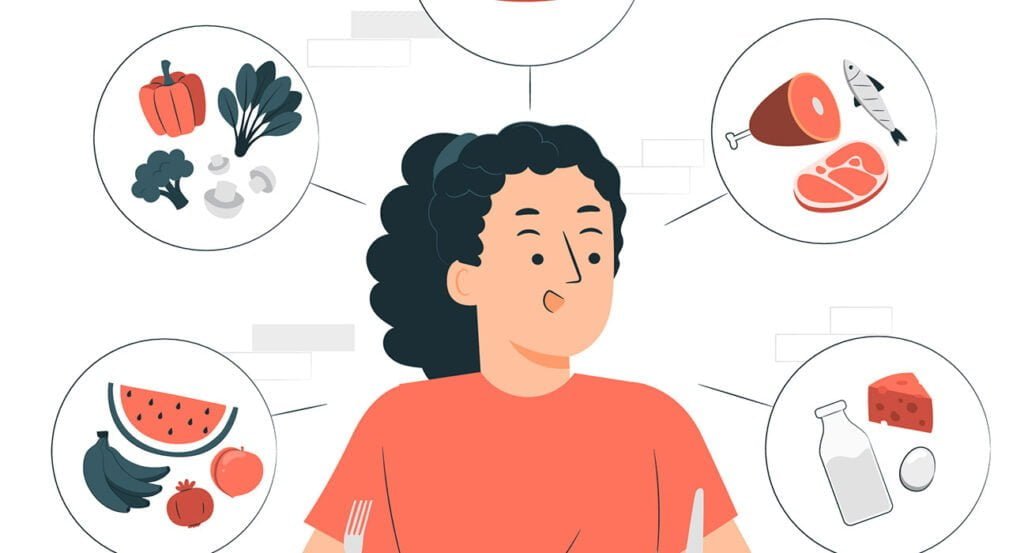“Is our breath, food & mental health interconnected?”
yes of course they are! To begin with, let’s talk about our breath. Did you ever realise that our breath is the first act of life and not so surprisingly the last act of life as well? In the initial days of college, where emotions are havoc with all the unavoidable teenager issues, this quote by Sri Sri Ravishankar, a humanitarian from the Art of Living Foundation, really struck a chord within me – “Our breath has a link between body and emotions and by attending to the breath one is able to get rid of negative emotions”. It is so simple, yet so profound. Our breath starts right at birth, until the very end yet it is one of the most overlooked or unnoticed actions.
Breath
We’re unaware of the importance and the secrets our breath holds with it. Have you ever noticed your breath when anger takes over you? If you just take a moment to think of a situation where you were really angry, you must have observed that your breath is really rigorous or fast when you’re angry. Similarly, when you’re sad or crying, have you ever noticed how your breath changes? It’s either too shaky or you’re breathing heavily.

Now, just take a moment to realise how your breath is when you’re really happy! It’s a lovely, calm and joyful breath! As Sri Sri Ravishankar explains, “For every emotion, there is a particular rhythm in the breath. If we understand the rhythm of our breath, we are able to have a say over our mind; and one can win over any negative emotions like anger, jealousy, greed and smile more from our heart”.
Now if you take a moment to notice, our ancient saints knew this quite well, and that’s the reason we have the origin of the sacred and the most popular and trending practices for mental well-being. ‘Yoga and Meditation’ right within “India”. Where the entire practice is connected to the roots of our breath and is aimed at achieving that happy and peaceful state of mind.
Read: Tips to Manage Mood Swings and Regaining Emotional Balance
Yoga
Furthermore, yoga is that union of our breath, body, mind and spirit and a mode that helps us achieve that state of deep mental rest and inner peace. Enabling one to go deeper into meditation or a state where our mind is devoid of any thoughts or thoughts that don’t bother us anymore. This of course takes practice and can be learnt. And achieved over a period of time under the guidance of a master.
Affirmations and Positive Self-Talk
Most of the diseases that we have today are directly or indirectly related to our thoughts. Recurring emotions going on within our heads play a significant role in this connection. This is where affirmations play a crucial role as well. Louise Hay, explains “An affirmation is really anything you say or think. A lot of what we normally say and think is quite negative and doesn’t create good experiences for us. We have to retrain our thinking and speaking into positive patterns if we want to change our lives. An affirmation opens the door.” Thus, even just through positive self-talk, we have the potential to develop a positive mindset towards our mental health. This can significantly improve the quality of our lives.
Food
Moving on to talking about how food can impact our mental health; Have you realised how your day feels if you’ve eaten something too heavy, or for example eaten something that hasn’t digested well in the stomach? You may feel a sense of bloating, constipation or uneasiness.

This particular experience of yours impacts your mood, emotions, and the way you feel and finally results in impacting the quality of your day. In simple terms, it’s all about the kind of food we eat and its impact on our gut health. Did you know, that our gut has been termed as “The Second Brain”?
Read: High Consumption of Fried Food may harm our Mental Health
Emeran Mayer says that ‘A big part of our emotions are influenced by the nerves in our gut’ (in his book, The Mind-Gut Connection). Have you heard about the term, “Gut Feeling” or having “Butterflies in the Stomach?”. Yes, they’re all scientifically valid and physiologically exist, as described by Michael Gershon (in his book ‘The Second Brain’).
‘The gut-brain axis (GBA) consists of bidirectional communication between the central and the enteric nervous system, linking emotional and cognitive centres of the brain with peripheral intestinal functions; and there’s recent research that this is influenced by gut microbiota’ (Carabotti, Marilia et al. 2015).
In other words, there are more neurons running and sending signals from our gut to the brain than from the brain to the gut. Michael Gershon states “Add on the nerve cells of the oesophagus, stomach, and large intestine and you find that we have more nerve cells in our bowel than in our spine. We have more nerve cells in our gut than in the entire remainder of our peripheral nervous system”. Isn’t that surprising?
Thus, most of the time, how we feel or what’s going on within our heads can largely depend on the type of food we eat. It also relies on the way our guts are functioning, responding, and signalling to our brains.
Furthermore, to explain this, there is one such nerve that you should really know about. This nerve is physiologically responsible for the signals and connections determining our mental health and overall well-being. And, ladies and gentlemen, it’s none other than our “Vagus nerve”! The Vagus nerve also known as the “pneumogastric nerve” is the longest of the 12 cranial nerves.
“Vaga” in Latin means “to Wander.” This nerve, true to its name, extends and wanders all the way from our brain stem to the abdomen, specifically in the stomach region. Thus, it is one such nerve that is involved in the control of our heart rate, specifically via the cardiac muscles, and breathing, which is connected via the lungs. It also plays a role in digestion, stimulating peristalsis and gastrointestinal secretions. To conclude on food, what we eat can play a major role in determining our mental health.
Make sure you include proper portions of fresh fruits and vegetables along with the cereals (Dal, Chapati, etc.). Eating fresh and eating clean can be a significant factor that can play a role in improving one’s mental health. Also, significant amounts of nuts, seeds, and omega-3-rich foods are vital for the brain. They may help in memory enhancement, which tends to decline as we age. To name a few; Walnuts and flax seeds are excellent sources to be included in the diet every day.
Lastly, whatever you choose to eat, make sure you put your entire effort and action towards enjoying every morsel that you put in your mouth. Being mindful and just noticing and being aware of the way your meal makes you feel at that moment. This simple technique which in the modern world has been termed as “Mindful Eating’. There is a fantastic and my favourite Zen Proverb that really sparks the sense of what I’m trying to convey; “When walking, walk. When eating, eat.”
Unfortunately, in today’s modern world, we’re following something like “When walking, check your cellphone. When eating, check your cell phone.” Hilariously, To continue the proverb and to add on a few more lines to adapt it to today’s generation; “When pooping, use your cellphone, when bathing use your cellphone,” and it goes on. Thus, being more mindful of every action or task that we’re performing is crucial. This applies to everything, from eating our meals to completing or achieving our day-to-day tasks. Just being aware and mindful, can take us a long way in the kind of life and the quality that we’re all, in general, looking up to in a day.

Additionally, these were a few things that I’ve learned over the course of time from my experience. More than learnings, these are the practical experiences that I’d suggest to each one of you as an individual. Genuinely speaking even if you apply one of these changes in your life it’s sure to help you towards improving your mental health and the quality of your life.
How do you know your Gut is Functioning Well?
How do you know whether your gut is functioning well or it has some issues? Well, if you ever feel too bloated, experience a gaseous feeling in the stomach, or suffer from constipation, acidity, or acid reflux – among other symptoms. It’s a sign that you need to start taking care and listening to your body.” Sometimes, the signals from your body, such as the symptoms mentioned above, are not just symptoms. They are a way of demanding attention, care, and respect. We often skip our meals or take meal timings for granted at the cost of an unavoidable office meeting or an event, etc. It’s high time we all understand and value our timings.
Quick Tips to Take Good Care of Your Gut:
Consume a good amount of probiotics and prebiotics. What are they?
To put it simply probiotics have been termed as a category of foods that have a live strain or microorganism or good bacteria in it. Probiotics are helpful in restoring the gut flora or simply, it is helpful in fixing the environment of your gut. Some commonly consumed probiotics include Yoghurt, Kimchi, Fermented vegetables with culture, Sauerkraut (pickled cabbages), Kimchi, Kefir, Yakult, etc.
Prebiotics are a type of non-digestible fibre or special plant fibres that act as food for the gut flora. They also act as food for the probiotics.
Some common examples of prebiotics include;
- Vegetables like onions, garlic, asparagus, spring onion, beetroot, chicory, sweet corn, etc.
- Nuts and Seeds like Cashews and pistachios.
- Legumes like chickpeas, red kidney beans, lentils etc.
Quick tips to improve your state of Mental Health:
Firstly, become aware of your Emotions and accept the way you feel. Most often we choose to wipe off or avoid a certain situation or the way we may be feeling. Acceptance is one of the basic keys.
Practice gratitude. It could be small moments from the day or even just the act that you’re grateful for the roof over your head. Before going to bed, just make sure you list down or ponder over at least 5 things that made you feel grateful for the day. It could be as simple as you’re gratefulness for just being alive!
On waking up, practice yoga, meditation or breathing techniques and exercises. This would help set the rhythm for the day and get you going.
Make sure you eat clean, eat healthy and well-balanced meals. You don’t have to follow fad diets or do something that’s harsh on your body. Eat a well-balanced meal with lots of fresh foods, and most importantly make sure you “Enjoy” whatever you choose to eat.
Set your gadgets aside and Eat mindfully. In other cases, eating with a friend/loved one, or family could be another way to set up those happy moments and bonding to take place. Have an activity or hobby that makes you feel good. It may be running, dancing, going for a walk, playing with your pet, etc. Indulge in some creative activities like drawing, painting, doodling, etc.
Journal your thoughts or feelings and express yourself in a journal or a diary. If you do not have one yet, I highly recommend this tip. It is something that would help you let out those suppressed emotions or experiences you feel you have not been able to share with anyone.
Speak to a friend! Just say hello! With the ease of many social media apps, like WhatsApp or Instagram, even saying hello and catching up with your friends can uplift your mood.

Get enough sunshine!
Soak yourself in the morning sun and get that dose of vitamin D which would again shoot up your energy levels and get you going for the day! Often, low vitamin D levels affect mood and behaviour. Low levels of vitamin D are associated with a risk of depression! So Bathing in the early morning sun is a lifestyle in your daily routine
Cheers!
Read more related Article
- Mindfulness: A key to unlocking Life Amidst Tough times
- Benefits of Mindfulness on Anxiety and Daily Life
- Mental health during Exam Season













Leave feedback about this